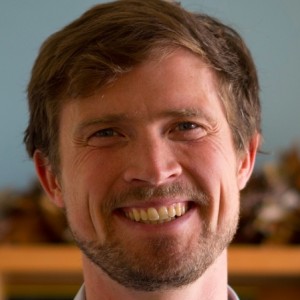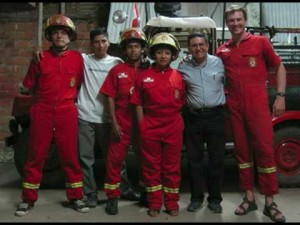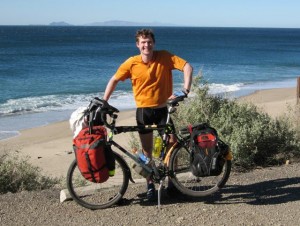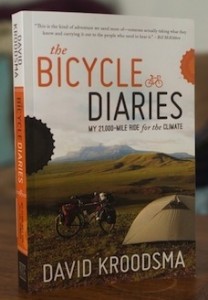There must have been something in the air in 2005 – David Kroodsma set out on his journey the same month I set out on Atlantic (Nov 2005) but arrived a year later (March 2007). In the meantime, he and his bicycle had covered 16,000 miles across 16 countries, from San Francisco to Tierra Del Fuego. And, just as I was using my ocean rowing to raise awareness of environmental challenges, David was using his bicycle rides to raise awareness of climate change, which he had studied for his Masters degree.
I first met David back in 2009, when he and I were both taking part in the Climate Ride from New York to Washington DC. That winter we were also both in Copenhagen for the COP15 climate change conference, where he had won a competition to become a Hopenhagen Ambassador for the Huffington Post. And we’ve met up a number of times since in San Francisco to discuss environmental advocacy. So I was delighted to welcome him to the show.
Climate Change Missionary

“The person most converted on a mission is usually the missionary.” (David Kroodsma)
It was a real delight to talk with David Kroodsma about his adventurous environmental advocacy. It seems that, like mine, his adventure started out as seeming like a great platform for a message, but became so much more than that – that the adventure became an intrinsic part, not just of the message, but of the messenger.
What impacted me most about this conversation was the point, well made by David but all too often forgotten, that environmental challenges do not arise in isolation, but are engendered by the cultures and the economic conditions in which people exist.
So if there is a culture where people watch TV programmes about people who are living more luxurious lifestyles than they themselves are, it is a natural response to want to improve their standard of living. Fairness is a powerful psychological driver, and if someone else has more than we do, we want to bring them down, or raise ourselves up, or both. Look at how many of us in the developed world feel about the 1% – I would guess a combination of self-righteous disgust and/or envy. It may be worth reminding ourselves that while we’re looking at the 1%, the developed world is looking at us, the 10% or whatever, and wanting what we have.
David also pointed out that there are two possible approaches (or a combination of them) to creating the changes necessary if we are to have a sustainable future: the technological approach, and the cultural approach.
I had (as you may be able to tell from the conversation) been sceptical about using technology to solve our problems, feeling that it ran contrary to Einstein’s dictum that “Problems cannot be solved with the same mindset that created them”.

But maybe Buckminster Fuller was right, when he said, “You never change things by fighting the existing reality. To change something, build a new model that makes the existing model obsolete”.
But what kind of model? The word could refer either to a cultural model, or a technological one.
In a perfect world, maybe we would change the culture so that instead of aspiring to greater wealth as individuals, we sought instead to achieve better distribution across society. (Whoo, I’m glad I’m writing this in London, where I can say such things without being branded a communist!)
But we’re not in a perfect world. We can’t fight the existing reality: that the majority of humans will always aspire to improve their lot, especially when presented daily with images of people who have more than they do.
So maybe David is right, and improvements in technology are what we need, so we can meet the growing per capita needs of a growing population from the finite resources available on the Earth.
What do you think?
(But for an interesting counter-argument, read Paul Gilding’s The Great Disruption: Why the Climate Crisis Will Bring On the End of Shopping and the Birth of a New World)
Other great quotes from David:
“Poverty is the biggest environmental problem. How can we make clean energy cheap enough so people use it instead of coal?”
“How can we become wealthy and non-polluting?” (Wealth in the sense of quality of life)
“It’s about sharing, and it’s about quality of life. How can we make it better?”
To subscribe to the show via RSS or iTunes, please click on the appropriate button below.
Show Notes

3:00 What first inspired David to ride from San Francisco to Tierra del Fuego? The 900-mile warmup lap from Portland to San Francisco
4:55 How much was it a personal crusade, how much was environmental campaign?
7:00 Getting the message out via presentations in schools, the media, blogging
8:30 How the mission changed the missionary
9:50 The physical journey – and the relative hazards of ocean rowing and bike touring
18:20 What?! He never felt like quitting?!
20:00 What is the biggest environmental challenge facing us? The answer may surprise you.
22:50 Is there anyone in the world who doesn’t have a TV? And what is the effect of that?
26:00 The two sides of environmentalism: a) how do we use technology, and b) how do we change our culture to overcome our problems?
28:20 The North American ride
31:00 The existence of climate change deniers – the view from the cycle route
32:30 The greatest enemy: apathy. How to engage the public? Make environmentalism about aspirations, not sacrifices.
35:30 David’s day jobs with EcoWest and Skoll Global Threats – plus the upcoming Asian bike ride
40:30 Environmental advocacy begins at home
***To claim your free audiobook, please follow the Adventure Podcast affiliate link.***
Links

David’s expedition website: Ride for Climate
Kickstarter for The Bicycle Diaries
The Bicycle Diaries on Facebook
10 Tips for Biking East Europe
COP15, Copenhagen (Wikipedia page)
David interviewing Sir Richard Branson
